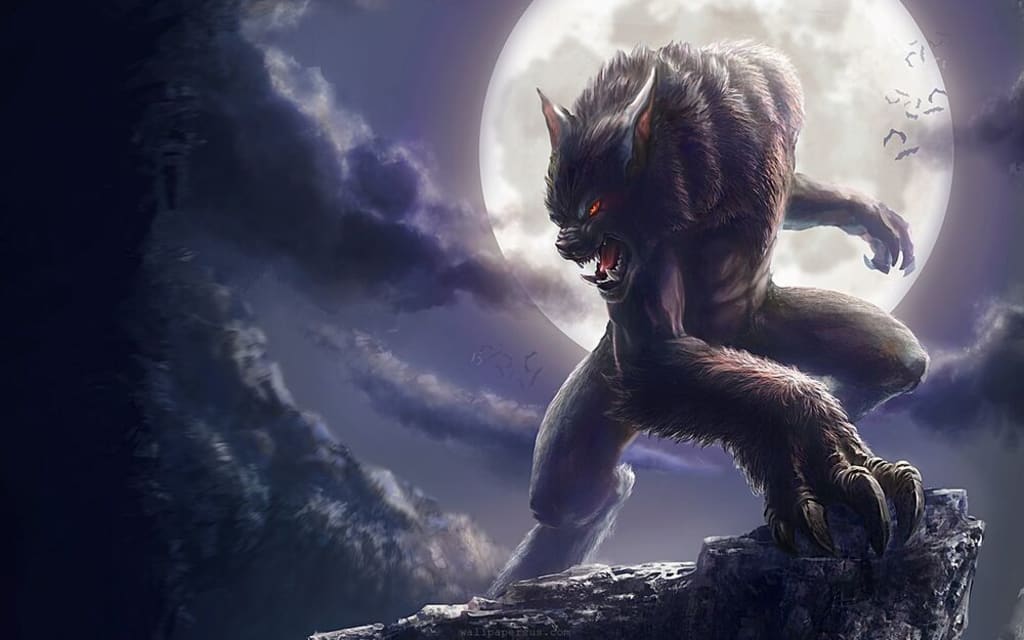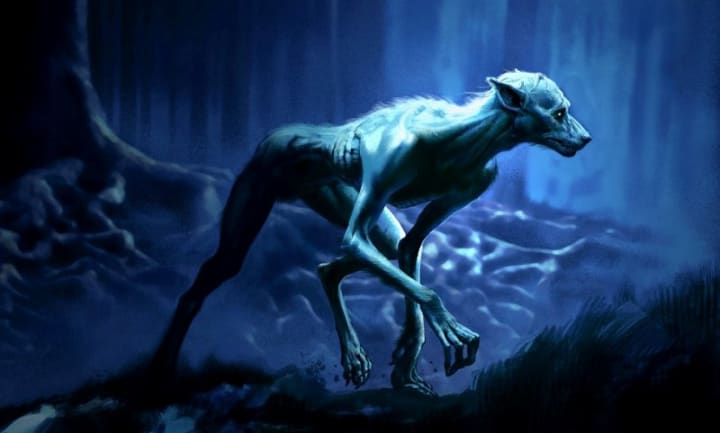Symbolic Monsters of Legend - Werewolves
A discussion on the symbolism of werewolves.

Werewolves are trickled throughout various folklores from Mesopotamia to Ancient Greece to the Nords to 14th century Western Europe. Their historical interpretations and even their modern representations have consistently been portrayed in bloodshed, shape-shifting, and animalistic instinct. I'm going to explore the symbolism of werewolves to further understand the beastial intrigue of this monster of legend and then propose my own interpretation.
A Brief History
The oldest werewolf tales focused on the mystical shape-shifting of man becoming a wolf. This happened through curses, like in The Epic of Gilgamesh or the Greek Legend of Lycaon. Sometimes the shape-shifting happened intentionally, like in the Nordic Saga of the Volsungs and in 14th century France. They developed a violent reputation quickly. We're used to hearing about a werewolf transformation happening under a full moon, but the earlier tales mentioned the shift being more magical, like being cursed by Zeus, wearing a wolf pet, or drinking an enchanted ointment. Peter Stubbe, more famously known as the BedBurg Werewolf, claimed to have an enchanted belt that caused his transformations and led him to slaughter then eat people. Intentional or not, the werewolf transformation can be interpreted as an emboldenment of raw strength and fury, like the Nords perceived it, or as a punishment where a person once having willpower and awareness becomes ruled by a beastial nature and blinded by it. Men accused of lycanthropy, the shifting or belief in shifting into a werewolf, were burned to the stake, like witches. Later, werewolves were expected to be harmed or killed by silver.
A little more explanation of the werewolf's history is in the video below.
A Modern View
Today we have a collection of many werewolf movies and television series that display similar qualties to their legends. The YouTube channel posted above, Mythology and Fiction Explained, claims quite bluntly that an audience's interest in the werewolf boils down to sex appeal and the gritty, primal behavior of the characters no matter their gender. Other than being sexualized, the werewolf legends were adapted to modern media by changing what kills a werewolf, giving them regeneration abilities, and flip-flop between whether or not a werewolf curse can be spread or cured. Even the shape-shifting feature can appear as incredibly gruesome or just have mild changes (like facial hair, glowing eyes, and pointed ears).
Some commonly known werewolf movies and shows are: The Underworld Trilogy, An American Werewolf in London, Ginger Snaps, Werewolf in London, Teen Wolf, Hemlock Grove, Bitten, The Vampire Diaries, The Originals, Being Human.

Werewolf Symbolism
What most of us get out of the werewolf legends is a person transforming into a beast and submitting to a maddening urge to spill blood. I feel what's being missed is how much humanisim and anti-humanism there is in this legend, especially since it's common to feel shame for giving into an instinct or impulse. In humanism, a progressive philosophy, people are expected and encouraged to take control of one's life and develop an innate goodness that's already within them. Reason and logic is ultimately valued. A humanist would condemn the werewolf mentality; others would feel akin to it. If impulse and desire rule someone's life, they are quickly labeled a monster and someone that only brings mayhem when one is expected to live a life of self-control and dignity.
If we go back to the Nordic approach to the werewolf, giving into impulse and instinct can be a freeing and empowering experience. Yes, the Nords/Vikings most likely were under the influence of the hallucinogenic plant they ate, but combining that with the animalistic mentality of "letting lose" is something to pay attention to. The werewolf does symbolize violence, but also symbolizes freedom only if you have the mindset of a wild one thriving on that freedom. Even the Nordic tale pointed out that consequences come from reckless and ruthless action, yet the other natural responses most animals have, such as inflicting or witnessing harm towards a relative or offspring, shows there is more to the animalistic mind than just violence. The werewolf is raw, but not every werewolf tales leads to a spiraling madness.
More commonly, if a werewolf character in a story doesn't embrace their wild side, what could be their freedom becomes a cage. It's a tug-of-war between being a man of self-control and a beast overtaken by repressed desires. Rationality versus desire is an everlasting inner conflict within humanity and it's more logical to address it rather than pretend it isn't there. Going back to humanism, rationality and logic strive to solve conflict without explanations that are supernatural or transcendental. Perhaps it's strange to bring this up in a conversation about werewolves, but I think it's intriguing that a human's primal nature can be so overwhelming that in some minds it transcends logic and manifests into physical mutation. It's almost lik a form of self-punishment for not being able to use logic to master instinct. The werewolf in legend pulls its power from many sources and has lasted long enough to enter the field of psychiatry with lycanthropy.
Consequently, the werewolf blurs the line between logic and desire and represents more than just a wild, violent beast. It symbolizes the messy gray area where logic, desire, and punishment mix together and create a sort of madness that can't easily be categorized. The werewolf isn't simply a reckless creature, but a self-perpetuating curse, or perhaps a warning, for those who aren't "human" enough.
Thanks for reading.
Connect with me on my website, Twitter, Facebook, Instagram, or Tumblr if you'd like to chat more on this topic.
Sources:
"Werewolf Legends". HISTORY: https://www.history.com/topics/folklore/history-of-the-werewolf-legend
"Why Are Werewolves So Popular? The History of the Werewolf Legend". Mythology & Fiction Explained: https://www.youtube.com/watch?v=AZizDu1fi_g
"Definition of Humanism". American Humanist Association: https://americanhumanist.org/what-is-humanism/definition-of-humanism/






Comments
There are no comments for this story
Be the first to respond and start the conversation.